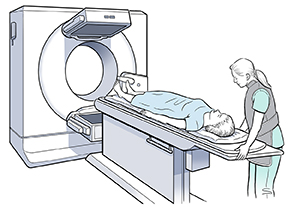Gastric Emptying Scan
A gastric emptying scan is an imaging test. It measures how quickly food travels from the stomach into the small bowel (intestine). During the test, you’re given a meal to eat that contains a small amount of radioactive substance (tracer). Then scans of the stomach are done. The tracer shows up clearly on the scans and tracks the food's movement through your stomach. This test is most often needed if you have symptoms that suggest a motility problem. Motility refers to the movement of the muscles in the digestive tract. The test takes about 4 hours.
Before the test
-
Tell your healthcare provider about any medicines you’re taking. This includes vitamins, herbs, and prescription and over-the-counter medicines. Certain medicines may need to be stopped for a time in the days before the test.
-
Follow any directions you are given for not eating or drinking before the test.
-
Follow any other instructions given by your healthcare provider.
Let the technologist know
For your safety, let the technologist know if you:
-
Are taking any medicines
-
Had recent X-rays or tests involving other substances, such as barium
-
Have current symptoms of nausea or vomiting
-
Had recent surgery
-
Have other health problems, such as diabetes
-
Have any allergies
-
Are pregnant or may be pregnant
-
Are breastfeeding
During the test
A gastric emptying scan takes place in a hospital or imaging center. It is done by a technologist trained in nuclear medicine or radiology.
-
You’ll be given a meal to eat. This can be a solid food, such as eggs, or a liquid, such as water. Both the food and drink contain a small amount of tracer. The tracer has no flavor. If you’re allergic to the food to be given, another type of food is used instead.
-
After you finish the meal, you’ll be asked to lie on your back on an exam table.
-
Pictures of your stomach are then taken with a machine called a scanner. You must lie still during this process. The scanner uses technology that can find the amount of tracer in the stomach. As food is emptied from the stomach, the amount of tracer decreases. This allows the technologist to measure the rate at which food is leaving the stomach.
-
More pictures of your stomach are taken at different times. This often occurs after 1, 2, and 4 hours of eating the meal. You can leave the room between the times the pictures are taken. But don't eat or drink anything or do any strenuous activities during this time.
-
Once the last set of pictures has been taken, the test is done.
 |
| With a gastric emptying scan, a machine called a scanner is used to take pictures of your stomach. |
After the test
You can go home shortly after the test. A nuclear medicine doctor or radiologist will send the test results to your healthcare provider. Your provider will then review the test results with you. This will likely happen a few days after the test.
Risks and possible complications of this test
There is a small amount of radiation exposure from the tracer. This amount is not considered to be dangerous. But it can carry certain risks if you are pregnant or breastfeeding. Talk with your healthcare provider about these risks before the test.
© 2000-2025 The StayWell Company, LLC. All rights reserved. This information is not intended as a substitute for professional medical care. Always follow your healthcare professional's instructions.